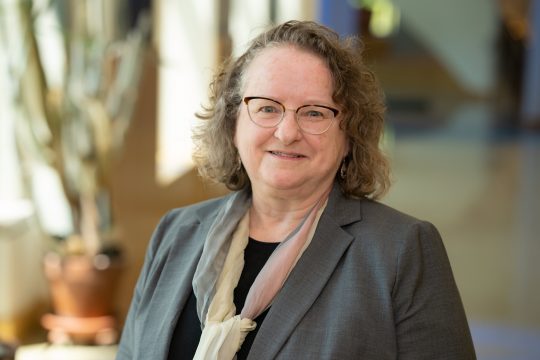Marnie Halpern, PhD, the Andrew Thomson, Jr., MD 1946 Professor and chair of Molecular and Systems Biology at Dartmouth’s Geisel School of Medicine, has been named an inaugural elected member of the Society for Developmental Biology Academy.

As part of the Society for Developmental Biology (SDB)—which works to foster an inclusive, global community of scientists and educators dedicated to furthering the field of developmental biology—the mission of the Academy is to recognize and celebrate its dedicated, long-standing SDB members.
To be elected an SDB Academy member, individuals need to demonstrate sustained contributions to developmental biology through excellence in professional activities including research, mentoring, teaching, and training, along with a record of engagement with or service to the Society.
“The SDB has played a large part in my career,” says Halpern, who is one of ten members to receive the honor for 2023. “From my first conference as a graduate student to serving on the board of directors and organizing meetings as a lab head, I have interacted with so many inspiring scientists and benefited from an incredibly supportive research community.”
Halpern’s lab uses zebrafish to study how the nervous system develops and controls behavior. She and her team focus their research on left-right differences in the brain—to determine how they emerge, which genes control asymmetry, and how they impact function and behavior. Since the zebrafish’s cell physiology is like that of humans, it’s a valuable genetic model for studying a myriad of diseases, from neurological disorders to cancer.
Halpern has received many awards for her work, including being named a Pew Scholar in Biomedical Sciences and a Fellow of the American Association for the Advancement of Science. She earned a prestigious Merit Award in 2107 from the National Institutes of Health to support her research on left-right differences in the brain. Halpern has also served on scientific and professional society boards, including the Society for Developmental Biology and the Genetics Society of America.
Founded in 1797, the Geisel School of Medicine at Dartmouth strives to improve the lives of the communities it serves through excellence in learning, discovery, and healing. The Geisel School of Medicine is renowned for its leadership in medical education, healthcare policy and delivery science, biomedical research, global health, and in creating innovations that improve lives worldwide. As one of America’s leading medical schools, Dartmouth’s Geisel School of Medicine is committed to training new generations of diverse leaders who will help solve our most vexing challenges in healthcare.